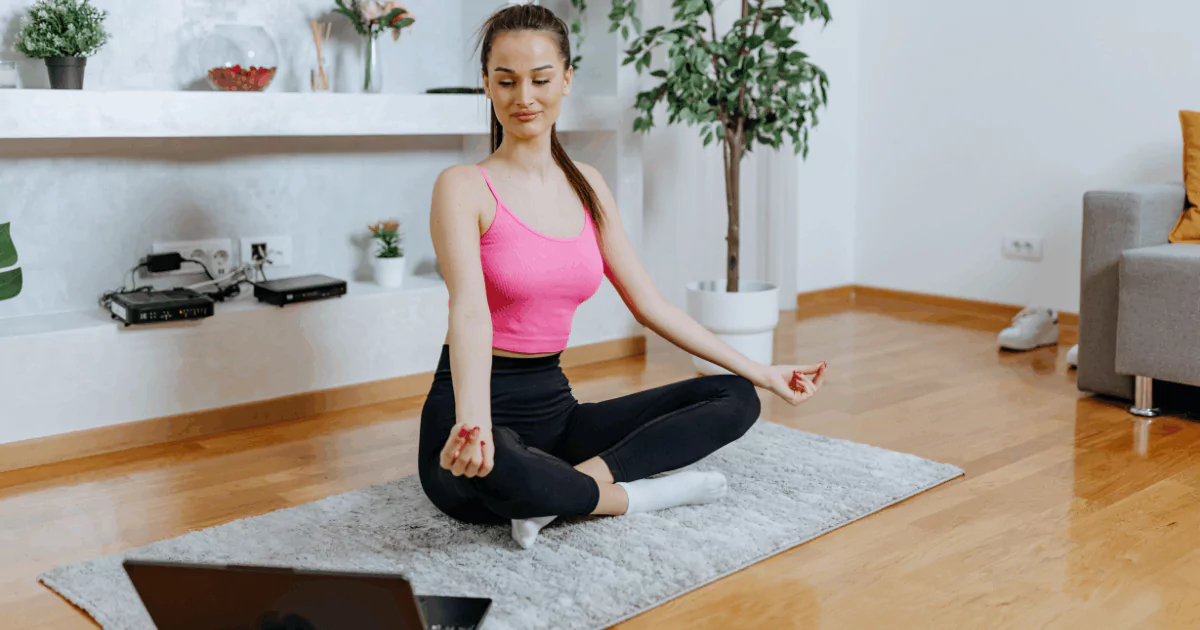Meditation is a powerful tool that can significantly help in managing stress and anxiety. One of the key benefits of meditation for reducing stress and anxiety is its ability to promote relaxation. By focusing on your breath or a specific thought, you can calm your mind and body, leading to lower stress levels. Additionally, meditation regularly helps you develop a greater awareness of your thoughts, allowing you to respond to stressors more effectively.
Another important aspect of the benefits of meditation for reducing stress and anxiety is its impact on emotional health. It encourages a positive mindset and can help you feel more centered and balanced. Furthermore, studies have shown that meditation can reduce the production of stress hormones, making it easier to cope with daily challenges. In summary, the benefits of meditation for reducing stress and anxiety are vast, providing a simple yet effective way to improve your overall well-being.

Benefits of Meditation for Reducing Stress
Many people are searching for ways to manage their stress and anxiety effectively. One practice that has gained popularity for its calming effects is meditation.
Understanding Stress and Anxiety
Stress and anxiety can often feel like heavy weights pressing down on us. Stress is our body’s response to challenges or demands. It can come from various sources, such as tight work deadlines, relationship problems, or financial worries. When faced with these stressors, our bodies go into “fight or flight” mode, releasing hormones like adrenaline and cortisol. While this response can be helpful in short bursts, constant stress can lead to serious health problems.
Anxiety, on the other hand, is a feeling of worry or fear about the future. It often involves racing thoughts and can make it difficult to focus or relax. This state of mind can create a cycle where stress leads to anxiety and vice versa, making it crucial to find effective ways to break this cycle.
What is Meditation?
Meditation is a powerful tool for improving our mental well-being, especially when it comes to the benefits of meditation for reducing stress and anxiety. By taking a few moments each day to sit quietly and focus on our breath, we can create a calming space for ourselves. This practice encourages mindfulness, allowing us to be present in the moment and recognize our thoughts without judgment. The benefits of meditation for reducing stress and anxiety can help us understand that our worries are often temporary.

Like clouds passing in the sky, our anxious thoughts can come and go. As we meditate regularly, we train our minds to respond to stress more effectively. This helps us build resilience and cope better with challenges. Ultimately, the benefits of meditation for reducing stress and anxiety can lead to a greater sense of peace and happiness in our lives. Whether we use mantras, deep breathing, or gentle movement, meditation can transform our relationship with stress, making it easier to navigate daily challenges.
Benefits of Meditation for Reducing Stress
Physical Relaxation
Meditation offers many benefits for reducing stress and anxiety. Meditating, our bodies relax deeply, even more than during sleep. This deep relaxation slows our heart rate and steadies our breathing, helping us feel calm. Think of a balloon slowly deflating; this is like what happens to our muscles when we let go of tension. By creating this space for relaxation, we make it easier to manage stress in our daily lives.

The benefits of meditation for reducing stress and anxiety include a greater sense of peace and improved mental clarity. As we practice regularly, we can respond to challenges more calmly and with less panic. In this way, the benefits of meditation for reducing stress and anxiety become clearer over time. Overall, meditation can be a powerful tool to help us find balance and tranquility in our hectic lives.
Mental Clarity and Focus
Meditation acts like a mental broom, sweeping away the clutter in our minds. We practice directing our attention, which helps improve our focus. This clarity can make it easier to tackle tasks without feeling overwhelmed. For instance, imagine trying to read a book in a noisy room; it’s tough to concentrate. But in a quiet space, the words flow smoothly, allowing us to enjoy the story. Meditation creates that quiet space in our minds, making it easier to absorb information and think clearly.
Emotional Regulation
Meditation helps us understand our emotions better. When we practice regularly, we become more aware of our feelings, which allows us to respond to them instead of reacting impulsively. Think of it as being a conductor of an orchestra. The conductor knows how to bring the music together, just as meditation helps us manage our emotional responses harmoniously. This practice can reduce anger, frustration, and sadness, enabling us to approach situations calmly.
Benefits of Meditation for Reducing Anxiety
Enhanced Coping Mechanisms
Meditation builds resilience, helping us cope better with life’s challenges. One of the main benefits of meditation for reducing stress and anxiety is that it teaches us how to handle discomfort and uncertainty. Instead of running away from these feelings, we learn to face them with calmness. Imagine a surfer riding the waves; sometimes, the waves crash hard, but a skilled surfer knows how to balance and ride through them. Similarly, the benefits of meditation for reducing stress and anxiety allow us to find our balance in difficult situations.
Regular practice helps us develop skills to navigate life’s ups and downs with grace. By focusing on our breath and being present, we can calm our minds and reduce overwhelming thoughts. The third time we recognize the benefits of meditation for reducing stress and anxiety is when we notice how it improves our overall well-being. Meditation gives us the tools to remain centered, even when life gets tough, helping us lead happier and more balanced lives.
Mindfulness and Present Moment Awareness
One of the key elements of meditation is mindfulness—being fully present in the moment. When we practice mindfulness, we learn to observe our thoughts and feelings without getting caught up in them. Imagine walking through a beautiful garden. If you’re busy worrying about what’s next, you might miss the vibrant colors and scents around you. Mindfulness helps us appreciate the present, reducing anxiety about the future.

Reduction of Negative Thought Patterns
Anxiety often involves negative thought spirals, where one worry leads to another. Meditation can help interrupt this cycle. Focusing on our breath or a calming image teaches us to shift our attention away from these negative thoughts. Think of it like changing the channel on a TV. Instead of getting stuck on a show that makes you anxious, you can find something uplifting or peaceful. This shift can reduce anxiety and foster a more positive mindset.
Scientific Support for Meditation
Research supports meditation’s benefits for reducing stress and anxiety. Studies have shown that regular meditation can lower cortisol levels, the hormone that causes stress. This practice helps the body relax and can lead to a calmer mind. One of the major benefits of meditation for reducing stress and anxiety is its ability to change the brain’s structure. For example, researchers at Harvard University found that mindfulness meditation increases gray matter in areas of the brain linked to memory and emotional control.
This suggests that meditation not only helps manage stress but also boosts brain function. By practicing meditation, individuals can improve their emotional regulation, which is another significant benefit of meditation for reducing stress and anxiety. As a result, those who meditate regularly often feel less anxious and more at peace. Overall, incorporating meditation into daily life can lead to a healthier and happier mindset.
How to Start Meditating
Starting a meditation practice can be simple. Here are some tips for beginners:
Be Patient: Meditation is a skill that takes time to develop. Don’t get discouraged if you find it challenging at first. Just like learning to ride a bike, practice will make it easier over time.
Find a Comfortable Space: Choose a quiet spot where you can sit or lie down comfortably. This could be a corner of your room or even a peaceful spot outdoors.
Set a Time: Start with five to ten minutes a day. Gradually increase the time as you become more comfortable with the practice.
Focus on Your Breath: Close your eyes and take deep breaths. Inhale through your nose, hold for a moment and exhale slowly through your mouth. If your mind wanders, gently bring your focus back to your breath.
Explore Different Techniques: There are various meditation techniques, such as guided meditations, body scans, or loving-kindness meditation. Experiment to find what resonates with you.
Incorporating Meditation into Daily Life
To make the most of meditation, try incorporating it into your daily routine. Here are some suggestions:
- Morning Routine: Before getting out of bed, start your day with a few minutes of meditation. This can set a positive tone for the day ahead.
- Mindful Breaks: Take short meditation breaks throughout the day. Even a minute or two of focused breathing can help recharge your mind.
- Evening Wind Down: Before bedtime, practice meditation to relax your mind and prepare for sleep. This can improve the quality of your rest.
- Combine with Activities: You can also practice mindfulness while doing everyday activities like walking or eating. Pay attention to your surroundings and sensations, grounding yourself in the present moment.
Conclusion
Meditation is an effective way to manage and reduce stress and anxiety. By focusing on the present moment and practicing mindfulness, meditation helps calm the mind and brings clarity to our thoughts. One of the key benefits of meditation for reducing stress and anxiety is that it helps regulate emotions, making it easier to deal with overwhelming feelings. As we meditate, our bodies relax, which naturally lowers stress levels. The practice also improves our resilience in tough situations, giving us a better perspective on life’s challenges.
Another important benefit of meditation for reducing stress and anxiety is that it promotes mental well-being by creating a sense of peace and calm. Taking time out of a busy day to meditate is like watering a plant—it nourishes the mind and helps it thrive. The lasting benefits of meditation for reducing stress and anxiety are clear: it supports a balanced and peaceful life. So find a quiet space, take a deep breath, and start your journey toward inner peace.

